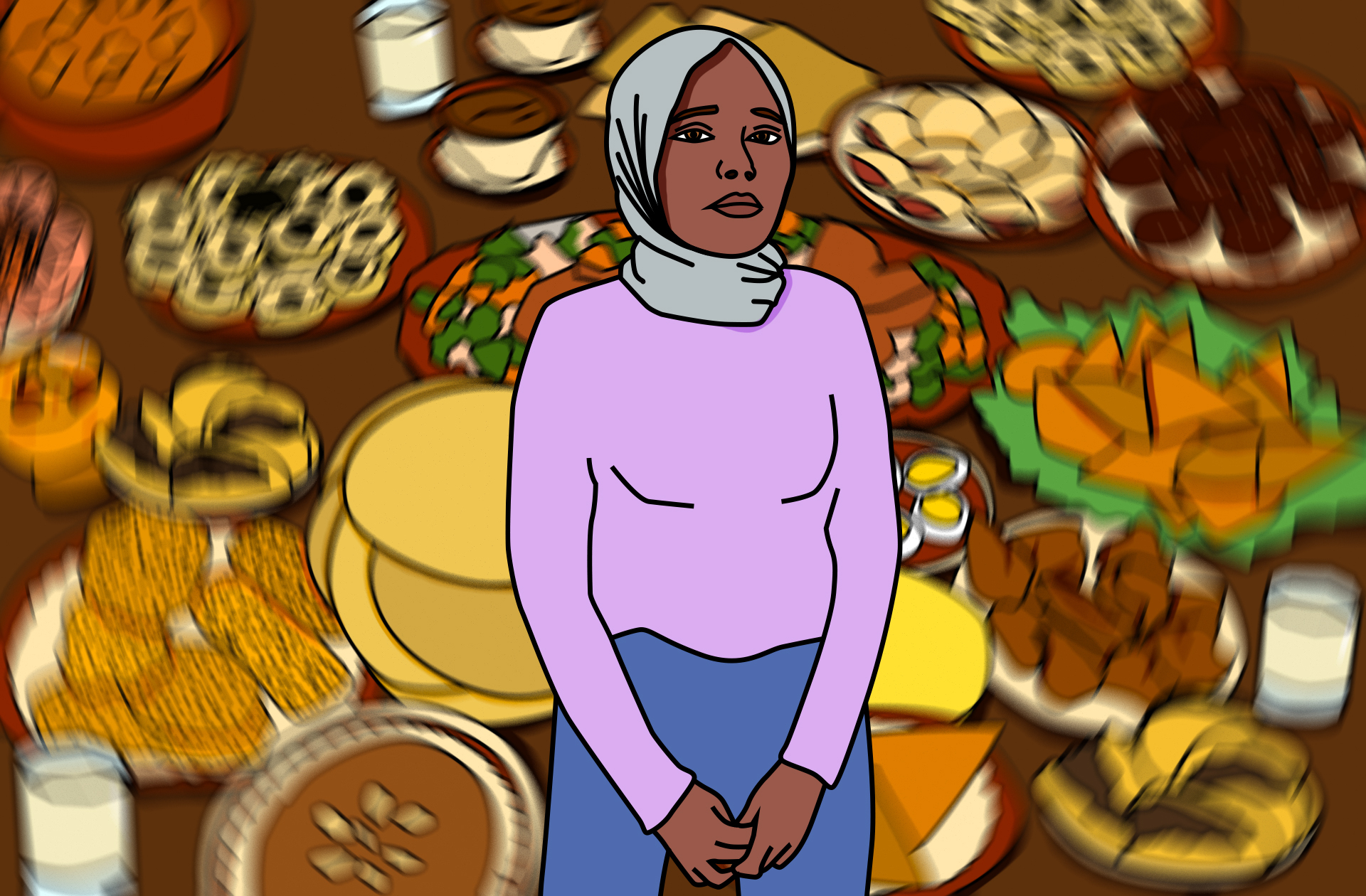*Some names have been changed
“For me this period is sacred”Lina* begins. “Hunger and thirst detach from your body a little, you have to continually experience the lack and resist it psychologically. »
Every year, many Muslims engage in meditation and purification of body and spirit during an emblematic period of Islam: Ramadan. A month of fasting from dawn to dusk, punctuated by prayers, which allows us to put ourselves in the shoes of the most destitute. But not everyone experiences it the same way…
Since 2018, Lina* suffers from bulimia : his daily life is marked by the ingestion of a large quantity of food which he expels up to thirteen times a day. Even though she has been trying to heal herself for almost a year, she still struggles to come to terms with her body and the contents of her plate.
In 2020 he will do Ramadan and fast with his family. And every day is like the last.
“During the day I feel like I can control my impulses, but in the evening I always end up worrying about crashing and eating one too many cartons.”
What Lina fears most is the feeling of having eaten too much, because “In two sips of soup you already feel full. » Even though during Ramadan he feels like he doesn’t eat more than usual, his stomach feels tight with thirst and hunger.
“We think about food all day”
Being worried about food during such a time is nothing unusual. But when the phenomenon is associated with a disturbed dietthe effects prove even more tiring for the head and body.
Sophia Desbleds, a non-Muslim naturopath, has already practiced the blessed month with her family, who she joined in Morocco when she suffered from bulimia. Accustomed to intermittent fasting and long fasting, which she had read and heard many positive things about during her training, she felt confident going into these four weeks. The process is purifying, and it is an opportunity to commune with her family, what harm could happen to him?
“Every day I convinced myself that what I was doing was good for me and for a good cause. »
But the therapist is soon overwhelmed by her demons.
“I understand that I was obsessed with food and how I looked. I constantly looked at my body in the mirror. Even though I knew it wasn’t her original goal, I was hoping that Ramadan would make me lose weight. It took up a lot of space in my head and, due to my eating disorder, was beyond my capabilities. »
Sophia Desbleds also explains that for many practitioners the charity month is a “two in one”: both an intense, spiritual journey and an opportunity to lighten up on the scales. The therapist, who explains that he has never done Ramadan in full, remembers feeling a certain relief when this sacred period ended.
Lina*, for her part, wants to remember a certain duality during this month:
“It could be a deprivation, everything revolves exclusively around food. In the morning you wake up with a hole in your stomach, obviously you think about it. At lunch time, you don’t know what to do during your lunch break while you work. As soon as you get home you spend hours preparing for the “ftour” [le copieux repas de rupture du jeûne, NDLR]…
We think about food all day. »
She notices itwith her eating disorders she no longer experiences Ramadan the same way. “This month had never stressed me, I came out of it with the impression of being more humble and more serene”, remember. Now she is always on guard.
But his notebook proves it, his crises were never so spaced out as during the sacred times. “Since I no longer eat or drink during the day, I went from vomiting about 13 times a day, to just once, then to nothing.”he specifies, admitting that he has already expelled her ftour twice.
When asked if this situation had ever made her feel like she was interrupting her spiritual journey, she responded in the affirmative.
“It’s like a mutilation […] I hurt myself and it is forbidden in Islam. »
Do TCAs “allow” people to skip Ramadan?
For patients the situation is difficult to maintain on a daily basis. Faïza Bossy, general practitioner, nutritionist and medical journalist, even considers it dangerous.
The expert recalls that Ramadan fasting involves a change in the chronobiological rhythm of eating. He returns to the religious indications and remembers that period “It is not recommended for people with chronic pathologies, health problems, tumors”. This list includes people with eating disorders, also characterized as harmful to health. Muslims who cannot fast for health reasons are encouraged to donate to those in need.
Of course we don’t force anyone to act against their faith, but if someone suffering from erectile dysfunction absolutely wants to experience the period, “But we need support”recommends the healthcare professional.
But still being able to address the topic… Sophia Desbleds takes the example of one of her clients who has just started Ramadan on April 13, 2021. The young woman suffers from hyperphagia, a disorder that leads to excessive consumption and uncontrollable eating . “He goes through periods of improvement, so his condition isn’t taken seriously; she doesn’t feel justified in saying that it affects her physical and mental health and she forces herself to practice Ramadan”develops the therapist, who denounces failure to recognize the disease.
At Lina*’s house the topic was not broached: her family knows nothing about her eating disorder. This year, even though she is aware of the possibility of not fasting (since her health is deteriorating), she wants to do Ramadan because “It is a period that I love and it would be very painful for me to lose it. »
During the first ftour, admits to feeling anxious. Finding yourself faced with so many foods is not trivial and ultimately translates into a real internal struggle.
“I came down, I saw the table full of chorba [soupe traditionnelle composée de viandes et de légumes, ndlr], pasta, sauces, salads, fish, fruit. The high table was full of pastries. I managed to stick to the salad and chorba. I was proud of myself.
I finally got some pastry to congratulate myself, and I hope the whole month goes like this. »
To testify about Madmoizelle, write to us at:
[email protected]
We can’t wait to read you!
What if the movie you were going to see tonight was a dump? Each week, Kalindi Ramphul gives you her opinion on which movie to see (or not) on the show The Only Opinion That Matters.
Source: Madmoizelle
Mary Crossley is an author at “The Fashion Vibes”. She is a seasoned journalist who is dedicated to delivering the latest news to her readers. With a keen sense of what’s important, Mary covers a wide range of topics, from politics to lifestyle and everything in between.





